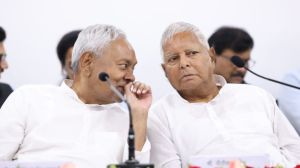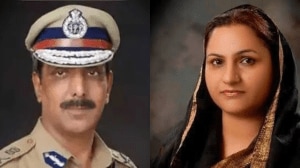In Haryana, shoemaker leads war against TB
It’s an unlikely battleground in India’s fight against TB, a disease that Prime Minister Vajpayee recently said poses a serious th...

It’s an unlikely battleground in India’s fight against TB, a disease that Prime Minister Vajpayee recently said poses a serious threat to the country’s progress and well-being. And Bansi Lal is an unlikely warrior.
But try telling him that. A shoemaker who lost his father to the disease and saw his brother struggle against it has turned a small room in his run-down double-storey house in Karnal’s Sadar Bazar area into a TB clinic for nearly 110 patients.
After having joined as a community volunteer in the tuberculosis control programme of the Government a year ago, he has put 50 patients on the path to recovery.
Starting from identifying possible TB patients in his neighbourhood to ensuring they take their medicines on time, Bansi Lal takes care of all. Be it the neighbourhood chachi who was heard coughing for months before Lal took her to the doctor, or his helper Kanaya, whose illness had turned chronic by the time. It was this work that earned him a WHO honour at a function held in the Capital last week as part of the second Stop TB conference.
Lal decided to join the TB war, for which he takes no remuneration, after his younger brother got and survived the disease. ‘‘My father died of it and my brother also got it. When it happens in the family, you realise how fatal it is,’’ he says.
Everyday TB patients from nearby houses line up outside Lal’s house to take their daily dose of medicine. If the queue gets too long, his teenage daughter Madhu and his younger brother Mohan Lal pitch in.
Inside the small room doubling as a clinic, the furnishings include a water cooler, a small stool holding two glasses, green-coloured almirahs stocking hundreds of boxes of medicine, a few old pieces of furniture and a register with the names and addresses of the patients. A graduate, Lal meticulously updates the registration cards of the patients as well as his own records.
‘‘Under DOTS (Directly Observed Treatment System), the Government provides the complete dosage of medicine required by a TB patient. The box contains drugs for the entire regimen of six or nine months. Each patient has his own box of medicine, with his name written on it,’’ explains Lal.
Doctors at the district TB centres register the names of the patients and after a full examination and diagnosis refer them to Lal if they happen to be from his neighbourhood. The TB health visitor introduces him to the patients, besides giving him a copy of their registration cards and boxes of their medicines for the entire regimen.
Lal is one of the hundreds of volunteers registered as DOTS provider under the Revised National Tuberculosis Control Programme (RNTCP) in India. The programme advocates taking help from the community to implement DOTS, wherein a patient is administred medicines under the supervision of a trained person—a doctor or a paramedic.
‘‘TB patients are divided into three categories—marked by a blue, green or red label on their box of medicines. For the first two to three months, a patient has to come every alternate day to take his dose of medicine, and I have to make sure he takes the medicine in front of me,’’ says Lal.
In the following months, the visits get reduced to once every seven days, when they are given a week’s supply of medicines. ‘‘On each successive visit, a patient has to deposit the empty strips of medicines with me, which are systematically kept in the boxes for the doctors’ examination,’’ Lal says. Besides this, Bansi Lal constantly reminds the patients of the dates of their check-ups and sputum examination. ‘‘If the patient fails to come on the fixed day, I send out my family members to look for him,’’ he says.
What works in this system is the personal rapport shared by a volunteer like Lal and the patients, most of whom are his neigbours or acquaintances.
A tea shop owner, Mohan Lal (50) lives in the house next to Lal’s and has been taking medicine at his DOTS centre for seven months. ‘‘Doctors say my infection is cured but I need to complete my regimen. It was easy for me as the medicine was available at a few minutes’ walk from my place,’’ he says.
Explaining the importance of volunteers like Lal, TB in-charge of the district Dr N. Saini says: ‘‘To have each and every TB patient monitored by a doctor is not possible in India as the patient load is very high and the number of doctors very less. So these community volunteers are a great help.’’
Though Karnal district has about 10 community volunteers, what puts Bansi Lal apart, says Dr Saini, is his compassion and the number of people who have been cured through him. ‘‘In Karnal, Sadar Bazar is the most densely populated area with a patient in nearly every household, and Lal has the highest number of patients under him,’’ she notes.





- 01
- 02
- 03
- 04
- 05


























